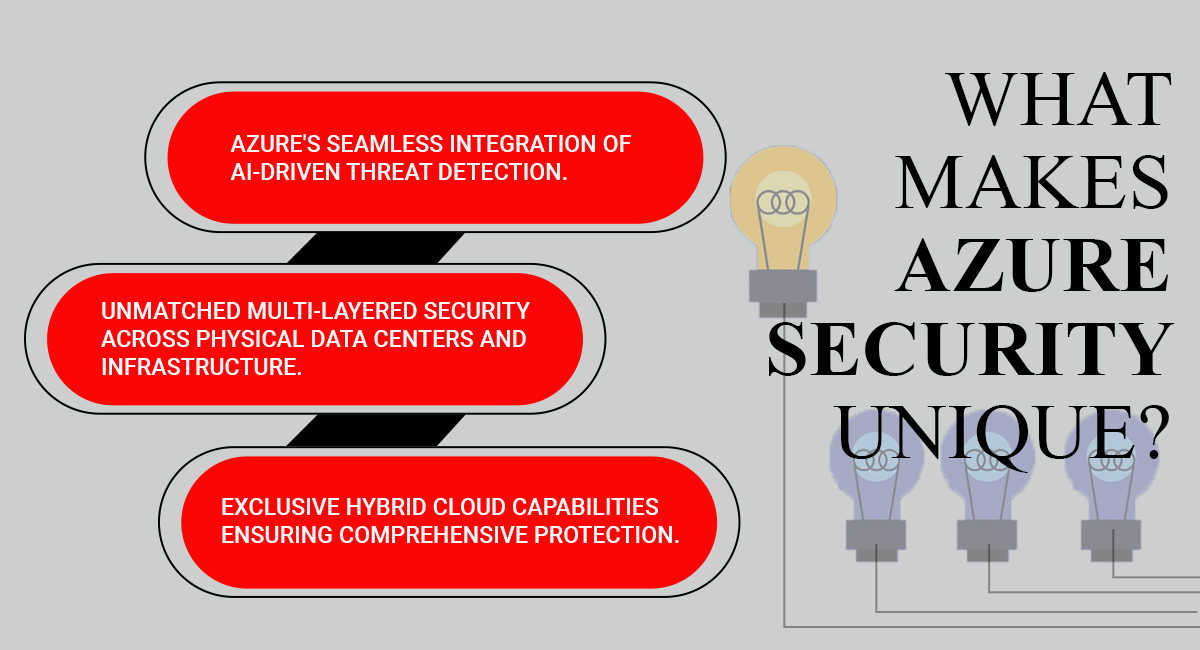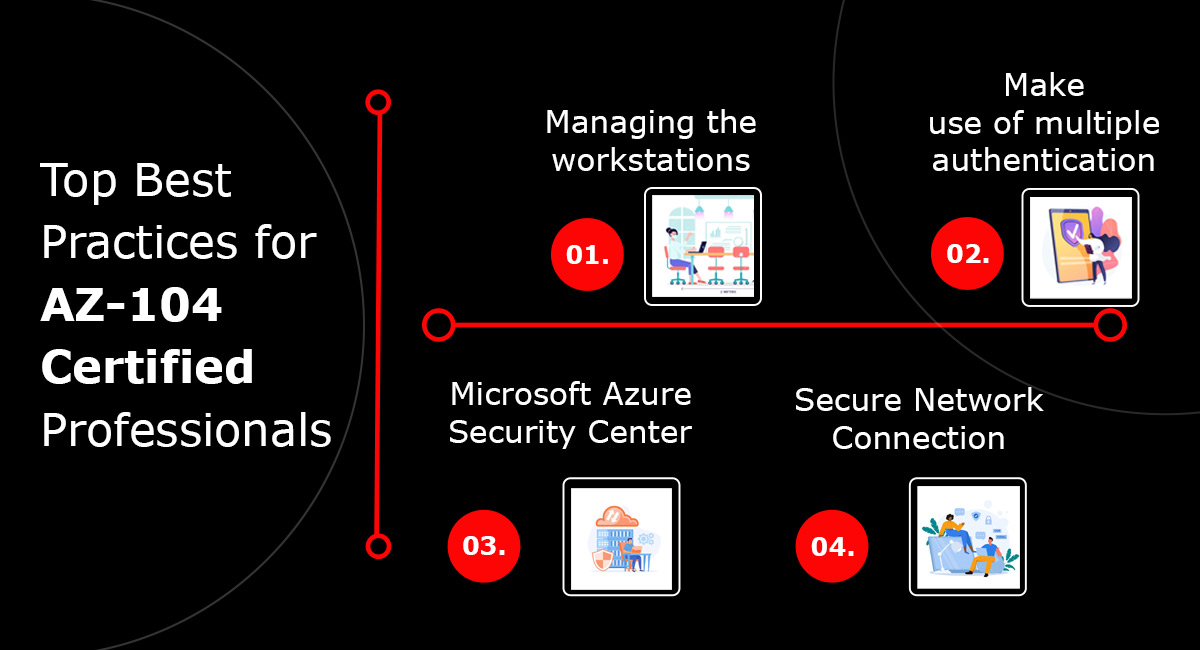Today's world is highly connected via Data. As businesses embrace the power of the cloud, data competition and securing your digital assets have become more complex than ever. Your Azure must be safeguarded at all times.
Azure Security best practices for AZ-104 Certified professionals include the development of Multi-Factor Authentication, Securing Administrator Access, Managing Workstations, and making effective use of Azure Security Center.
We will look for various best practices that bring visibility and control over the security of Azure resources, securing hybrid workloads deployed in Azure or non-Azure environments and on consumers' premises. This is where you will need to get Microsoft Azure Administrator AZ-104 Training & Certification.

One of the top and most reputablecloud computingservice providers available is Azure. Numerous services, including network, database, storage, and many more, operate together in Azure. Confidential information is stored and accessed by an organization several times a day.
A company cannot allow someone to breach its security, seize control of everything, and reveal private data.Microsoft Azure Administrator AZ-104 Training & Certificationoffers several options to fortify and safeguard your network. Although it will notify you immediately in the event of a significant issue, there are a few things you can take to guarantee double security with Azure.
Microsoft's security management solution for Azure users is called Azure Security Center. With the help ofAZ-104 training and certification,you will understand the following advantages that users of Azure Security Center can appreciate are:
The shared security architecture governs how the Azure security infrastructure functions, as the Microsoft Azure Security practices illustrates. This implies that, with the exception of customer-only settings, security is a joint endeavour between Azure and the client. However, when clients go to the cloud, several Azure customer security obligations alter.
The following differences exist in the division of labour across various cloud service models:
Now, we will explore the best practices that are beneficial forAZ-104 Certified Professionalsto make your Azure much more secure and robust.

On a daily basis,AZ-104 Certified professionalsneed to access websites over the internet. Imagine that you are accessing some confidential details, and simultaneously, you are accessing an unknown file from the open internet containing malware.
Now, how in which ways will it impact your business? You might become an easy target for hackers to inject malware and get access to personal data. Here, the only solution is to make use of dedicated workstations for critical and routine daily tasks.
The security concern towards strengthening the authentication procedure to restrict hackers is constant from pushing force attacks. There is no other method to make the system secure, but you can make it much more robust. There are some basics, including critical passwords and multi-factor authentication support, which make your most effortless authentication procedure more powerful and more secure.
Mircosoft Azurebrings the flexibility to make use of their directory services known as Azure Active Directory to safeguard the authentication. The expert with Azure Active Dictionary admin access also needs to enable multi-factor authentication.
Those accounts which have the most access are highly prone to risks. Therefore, it's essential to frequently check accounts with all administrative features and attributes at regular intervals. You need to block unnecessary access to these accounts; it will be beneficial for you.
Privileged identity management is an Azure Active Directory service to manage, identify, and control access to your business. With the help of this, you need to follow an activation procedure that will grant administrator rights for a limited time.
If you need an idea regarding Azure Security's best practices, then Azure Security Center is one of the best choices for you. Even if it charges a little bit to get the service onboard and maintained, it is beneficial for you if you aren't going to compromise with security.
It will help you with fundamental time threat protections, continuous CVE scanning, Microsoft Defender ATP licensing and Azure CIS compliance benchmarking. It also helps to monitor and analyze network configurations and virtual software.
The main benefits of Azure Security Center for experts include the control of traffic through configuring Azure Network Security Groups and Protecting web applications from threats through provisioning web application firewalls.
Systems and different resources that are accessed directly with the help of the internet are more prone to security threats. So, for this, it's essential to ensure the security of these resources, which can lead to threats to other resources.
The RDP port is accessible to the public internet for Windows Virtual Machines and Linux, and the SSH port is open. All of the available posts must be properly restricted and locked in order to reduce unauthorized access.
With the help of default, you just need to block ports 22, 3389, 5985, 5986, and 445 due to their communal ports, which leads to attacks. Azure's Network Security Group (NSG) restricts access from all networks except a few needed access points. Also, it promotes firewalls wherever possible.
Traditional tools and programs might bring a great start. Still, it would help if you also had tools with advanced capabilities to protect the applications from the changes made by criminals in the cloud circumstances.
It's essential to develop a robust backup and recovery strategy to ensure the continuity of services and preserve data integrity.Microsoft Azure Administrator AZ-104 Training & Certificationbrings services like Azure Backup and Azure Site Recovery for this requirement.
Leverage the Azure Policy to ensure security controls, standards, and support procedures. The Azure policy security baseline provides procedural guidance and resources for developing security recommendations specified within the practices.
Passwords and other private information are all encrypted into keys. These serve as a password for any security check and are far more secure. However, keys must be securely stored and encrypted to avoid loss or abuse. To secure cloud data, secure key management is essential.
Thecertified AZ-104 trainingconsists of several parts and services that require routine security maintenance. There are countless methods to breach a system, and the most popular targets for hackers are those with weak security.
By keeping a few fundamental concepts in mind withAZ-104 certification, you may significantly strengthen your network. You can make your Azure robust and safe by putting in some work and investing in a variety of Azure services.
🛡️ Follow top AZ-104 security best practices.
It takes ongoing and constant work to keep your Azure resources safe. The above blog includes the critical practices of Azure Security. Make sure to check that safeguarding your Azure resource from intrusions extends beyond just internet safety.
As a result, your security measures must evolve together with the cybersecurity industry. You are now more equipped to protect your Azure resources against intruders after reading this article's strategies. Once you enroll forMicrosoft Azure Administrator AZ-104 Training & Certificationyou will understand each and every aspect of Azure security, so without wasting any time let's connect.
Confused about our certifications?
Let Our Advisor Guide You